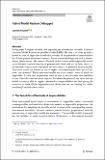Files in this item
Hybrid modal realism debugged
Item metadata
| dc.contributor.author | Fouche, Camille | |
| dc.date.accessioned | 2022-09-01T14:30:10Z | |
| dc.date.available | 2022-09-01T14:30:10Z | |
| dc.date.issued | 2022-08-31 | |
| dc.identifier | 280534713 | |
| dc.identifier | 34e5f7d1-d8c8-4064-aa58-ff4cb82ff7af | |
| dc.identifier | 85137202808 | |
| dc.identifier | 000848010700003 | |
| dc.identifier.citation | Fouche , C 2022 , ' Hybrid modal realism debugged ' , Erkenntnis , vol. First Online . https://doi.org/10.1007/s10670-022-00592-0 | en |
| dc.identifier.issn | 0165-0106 | |
| dc.identifier.uri | https://hdl.handle.net/10023/25933 | |
| dc.description | This paper is part of a PhD project conducted thanks to a scholarship of the ‘School of Philosophical, Anthropological and Film Studies’ at the University of St Andrews and a doctoral contract at Sorbonne Université. | en |
| dc.description.abstract | In this paper, I support a hybrid view regarding the metaphysics of worlds. I endorse Lewisian Modal Realism for possible worlds (LMR). My aim is to come up with a hybrid account of impossible worlds that provides all the plenitude of impossibilities for all fine-grained intentional contents. I raise several challenges for such a plenitudinous hybrid theory. My version of hybrid modal realism builds impossible worlds as set-theoretic constructions out of genuine individuals and sets of them, that is, as set-theoretic constructions from parts and sets of parts of genuine Lewisian worlds. Structured worlds are defined as sets of tuples: structured entities built out of Lewisian ‘raw material’. These structured worlds are ersatz worlds, some of which are impossible. I claim that propositions must be sets of worlds rather than members of sets. Once the construction is in place, I evaluate the proposal and show that my hybrid account is able to supply a plenitude of impossibilities and thus giving the resources to make all the hyperintensional distinctions we are looking for, whilst remaining Lewisian-conservative. | |
| dc.format.extent | 25 | |
| dc.format.extent | 1191720 | |
| dc.language.iso | eng | |
| dc.relation.ispartof | Erkenntnis | en |
| dc.subject | B Philosophy (General) | en |
| dc.subject | T-NDAS | en |
| dc.subject | NIS | en |
| dc.subject.lcc | B1 | en |
| dc.title | Hybrid modal realism debugged | en |
| dc.type | Journal article | en |
| dc.contributor.institution | University of St Andrews. Philosophy | en |
| dc.identifier.doi | 10.1007/s10670-022-00592-0 | |
| dc.description.status | Peer reviewed | en |
This item appears in the following Collection(s)
Items in the St Andrews Research Repository are protected by copyright, with all rights reserved, unless otherwise indicated.

